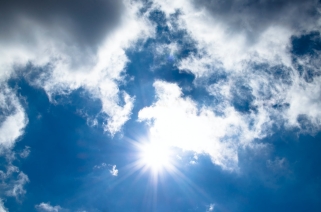Global pandemic or no, the 50th anniversary of Earth Day has come and gone.

Sadly, I saw very little acknowledgement of this half-century-old tradition meant to celebrate our responsibility to the planet that sustains us.
I’ve long espoused the vibrant history and critical importance of what should definitely be an internationally observed holiday dedicated to environmental action and education; if you’re not familiar, you can revisit my homage here. But amidst all the hubbub over COVID-19, it scarcely got a nod from major news organizations.
Still, in the face of our global pandemic, there are kernels of environmental wisdom, discovery, and yes, even hope strewn amongst the world’s headlines today. If only we, as a species, could pick them up and make the most of the revelations that this threat to our society has laid bare before us.
Yes, you heard me right. Despite the lackluster coverage of Earth Day’s 50th birthday in light of the pandemic’s rightful hysteria, if we look at the lessons and societal developments of the past two months with an environmental eye, there’s good news to be found and a promising opportunity…if we can make use of it.
Here are some things we’ve observed of late that give me a budding, if cautious, glimmer of hope:
-

Photo by Artem Beliaikin on Pexels.com
We can change our behaviors, quickly and effectively, to mitigate large-scale problems.
It is more than impressive how quickly our communities disseminated critical information, digested it, and acted with a measured, rational response driven by a clear purpose to “Flatten the Curve.”
- We are willing to sacrifice and substantially change to our way of life when our lives are threatened on a global scale.
Once it became clear that our health care institutions may quickly be overwhelmed, and likely result in countless unnecessary deaths due simply to a shortage of resources…We. Stepped. The f*ck. Up.
In a matter of days, we opted to do what was needed in the here and now. We altered our concepts, both individually and collectively, of what is necessary in life, or important, or inconvenient, or critical. We made sacrifices—difficult ones—and focused on the goal, without getting mired down in fears of what tomorrow would look like.
- The reversal of the environmental impact of our species begins much faster and with less effort than we might expect.
 In one month’s time, some of Earth’s most congested, smoggy, polluted areas have seen remarkable decreases in air pollution and CO2 emissions. Wild animals have re-entered habitat long prohibited by the noise and danger of human activity. Natural waterways have become much clearer with reduced human traffic.
In one month’s time, some of Earth’s most congested, smoggy, polluted areas have seen remarkable decreases in air pollution and CO2 emissions. Wild animals have re-entered habitat long prohibited by the noise and danger of human activity. Natural waterways have become much clearer with reduced human traffic.
In short, when we’re willing to make the sacrifices, Nature is all-too-eager to start healing her wounds. It’s her modus operandi. So if we’re willing to alter ours, we’ll see the benefits emerge almost overnight.
- Many facets of our economy have proven they do not require in-person labor made possible only by the burning of fossil fuels.
Who knew? It turns out, a whole metric shit ton of office-goers and other cubicle denizens can effectively work from home. Untrained and unprepared to do so, with extremely short notice!

Photo by Andrea Piacquadio on Pexels.com
My wife’s entire department, more than 100 people who regularly commute into an office downtown (some from more than an hour away), is successfully working from home. Not only has it cut down on fossil fuel emissions, but it has dramatically reduced their individual fuel costs, saved them time in both commute and prepping for work (showering is hard!), awarded them with more time to do things at home, and granted them unforeseen conveniences like a private bathroom, access to a full kitchen, and the ability to go pantsless at work with no one the wiser!
After WWII, Rosie the Riveter didn’t want to go back home to the kitchen. As we emerge from the constraints of this crisis, businesses had better prepare for a whole lot of, “I’m just gonna work from home again.”
- Our governing institutions, from local to state to federal to international, are (more or less) able to act quickly when grave scientific data is effectively gathered, disseminated, and accepted by decision-makers.
I’m not saying it’s been without challenges, folly, or pain, but for the most part, our governments have acted decisively and effectively in the public interest. Their swift actions have undoubtedly saved lives. We may not know what tomorrow holds, but thanks to them, we’re feeling a bit better about surviving today.
- We’ve remained vigilant, agile, and embraced a continually evolving idea of “good enough” instead of striving for absolute perfection.
As mitigation plans emerged, we soaked them up instantly. We made the necessary adaptations and then we went back to see what else we could do. Health experts and leaders kept at it: examining data, measuring impact, adapting strategies, and communicating their recommendations.
It played out differently everywhere, and only time will allow us to review and analyze what worked and what didn’t. Either way, we kept thinking and acting in accordance with what we thought might work best at the time…until something changed or compelled us to alter our plan.
So what am I getting at with all of this? I’m quite confident you can connect the dots.
If you remove “coronavirus” as the impetus behind these waves of recent change, and if you replace it with “overpopulation,” “climate change,” “habitat destruction,” “water shortages,” “mass extinction,” or “human pollution,” suddenly a wealth of possible remedies become considerably more achievable, feel less impossible, and give just a glimmer of hope that we might actually be capable of doing what must be done to successfully reverse our impact on this planet and all the species to which it is home.

Photo by Pixabay on Pexels.com
There is opportunity to be found in every crisis. In a very short time, we’ve seen some incredible adaptations and sacrifices from humanity. This pandemic has, and will continue to cost us dearly, but it also has presented us with some stark, inspiring truths about what we can accomplish when we’re under threat.
The threat of this pandemic on humans shall one day pass. When it has, the threat of humanity on itself and all other species will sadly be as imminent as ever. But hopefully, we’ll have some newfound lessons to inspire us to do what is necessary.
It’s been 50 years since the original Earth Day. In that time, human population has more than doubled; the rise in global temperature has accelerated by nearly 300%; Americans now produce an average of 40% more trash each day; we’re now witnesses to the Earth’s 6th mass extinction and we’re indubitably the cause behind it.
We’ve got our work cut out for us. We’ve successfully flattened one threatening curve in short order. Now let’s set our sights on the bigger, badder ones looming over us.*
It’s in our hands. And there’s not a moment to lose.
“Daddy, won’t you take me back to Muhlenberg County,
down by the Green River, where Paradise lay?
Well, I’m sorry my son, but you’re too late in askin’;
Mr. Peabody’s coal train has hauled it away.”
– John Prine
1946-2020
Rest by peaceful waters, John,
and F.U. COVID-19!
*Don’t wait until we muster our collective gumption to act. Here are some effective things YOU can do now to help reduce our impact.

Photo by Markus Spiske on Pexels.com

3 comments
Comments feed for this article
April 23, 2020 at 1:47 PM
A Bit
Brilliant! Such a solid article: points out the positives, provides solutions and acknowledges the outcomes if no action is taken. It is so well written!
April 23, 2020 at 3:28 PM
k rawson
I love this! What a positive take. You are absolutely right about all of it. This post made my week!
April 24, 2020 at 4:21 PM
peterkirsch
Thanks for reading, K. I really needed this.